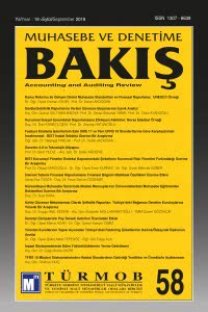HİLE DENETÇİLİĞİ MESLEĞİ ve SERTİFİKALI HİLE DENETÇİLİĞİ MESLEKİ STANDARTLARI VE AHLÂK KURALLARI
Hile Denetçiliği, Meslek Ahlâk Kuraları, Mesleki Standartlar
FRAUD AUDITING PROFESSION and PROFESSION STANDARDS of CERTIFIED FRAUD EXAMI- NER and CODE OF ETHICS
Fraud Examine, Code of Ethics, Professional Standards,
___
- ABDİOĞLU, Hasan (2007a).”Mortgage Sözleşmelerinde Üçüncü Taraflarca Yapılan Hileler ve Bu Hileleri Ortaya Çıkarmaya Yönelik Kırmızı Bayraklar”, Muhasebe ve Finansman Dergisi, Temmuz 2007, 160-171.
- ABDİOĞLU, Hasan (2007b). “ Hilelerin Önlenmesi ve Ortaya Çıkarılmasına Yönelik Proaktif Yaklaşımlar”, Muhasebe ve Denetime Bakış Dergisi, Mayıs 2007, 119 – 137.
- APOSTOLOU Nicholas, CRUMBLEY Larry D. (2008). “Auditors’ Responsibilities with Respect to Fraud: A Possible Shift?”, The CPA Journal, February 2008, 32 – 37.
- ARZOVA, Burak (2003). “İşletmelerde Çalışanlar Tarafından Yapılan Hilelerin Kırmızı Bayraklar Yoluyla İzlenmesi”, Muhasebe ve Finansman Dergisi, Kasım 2003, 120 – 124.
- BIERSTAKER J.L., BRODY, R.G. ve C. PACINI (2006). “Accountants’ perceptions regarding fraud detection and prevention methods”, Managerial Auditing Journal, 21 (5), 520 – 535.
- BOZKURT, Nejat (2000). “Muhasebe ve Denetim Mesleğinde Yeni Bir Alan: Adli Muhasebecilik”, Yaklaşım Dergisi, Yıl: 8, Sayı: 94, 56 – 61.
- CARNES, Kay C., GIERLASINSKI, Norman J. (2001). “Forensic Accounting Skills: Will Supply Finaly Catch up to Demand?”, Managerial Auditing Journal, 16 (6): 378 – 382.
- CARTER, Terry (1997). “Accounting Gumshoes”, ABA Journal, 83 (9): 36 – 37.
- CHO, Wendy K., GAINES, Brian J. (2007). “Breaking the (Benford) Law: Statistical Fraud Detection in Campaign Finance”, The American Statistician, 61 (3), 218 – 223.
- CPA Practice Management Forum (2007): 23
- CULLINAN, Charlers P., SUTTON, Steve G. (2002). “Defrauding The Public Interest: A Critical Examination of Reengineered Audit Processes and The Likelihood of Detecting Fraud”, Critical Perspectives on Accounting, 13, 297 – 310.
- EROL, Mikail (2008). “ İşletmelerde Yaşanan Yolsuzluklara(Hata ve Hileler) Karşı Denetimden Beklentiler”, Süleyman Demirel Üniversitesi İİBF Dergisi, 2008, 13 (1), 229-237.
- HABERMAS, J. (1971). Towards a Rational Society, London: Heinemann.
- HARRIS, Cindy K., BROWN, Amy M. (2000). “The Qualities of a Forensic Accounting”, Pennsylvania CPA Journal, 71 (1), 6 – 7.
- IRONS, Alastair (2006). “Computer forensic and records management-compatible disciplines”, Records Management Journal, 2006, 16 (2), 102 – 112.
- KARPARDIS, Krambia Maria (2002), “ A fraud detection model : A must for auditors”, Journal of Financial Regulation and Compliance, Vol.10, No.3, p.266-278.
- KAYA, Uğur (2005). “Muhasebe Mesleğinde Adli Muhasebe Uzmanlığı ve Türkiye Açısından Gerekliliği”, Muhasebe Bilim Dünyası Dergisi, 7 (1), 49 – 64.
- PAZARÇEVIREN, Selim Yüksel (2005). “Adli Muhasebecilik Mesleği”, ZKÜ Sosyal Bilimler Dergisi, 1 (2), 1 – 19.
- RENICK, M.Jacob (2007), “ A Phased Engagement Approach to Forensic Accounting”, The CPA Journal, June 2007, p.62-65.
- REZAEE, Zabihollah (2005). “Causes, Consequences, and Deterence of Financial Statement Fraud”, Critical Perspectives on Accounting, 16, 277 – 298.
- REZAEE, Zabihollah, BURTON, E. James (1997), “Forensic accounting education: insights from academicians and certified fraud examiner practitioners”, Managerial Auditing Journal, 12, 9, p.479-489.
- SMITH, Malcolm ; BAHARUDDIN, Ithnahaini (2005), “Auditors’ perception of fraud risk indicators: Malaysian Evidence”, Managerial Auditing Journal, Vol.20, No.1, p.73-85.
- ŞEN, Selim (2003). Hatalı ve Hileli İşlemlerin Tespiti İçin Denetim Teknikleri, Yaklaşım Yayınları, Ankara.
- TİDE (2005). Uluslararası İç Denetim Standartları Mesleki Uygulama Çerçevesi, Türkiye İç Denetim Enstitüsü Yayınları No: 3.
- UZAY, Şaban (1999). İşletmelerde İç Kontrol Sistemini İncelemenin Bağımsız Dış Denetim Karar Sürecindeki Yeri ve Türkiye’deki Denetim Firmalarına Yönelik Bir Araştırma, Sermaye Piyasası Kurulu, Yayın No: 132.
- WELLS, J. T. (1992). “Fraud Assessment Questioning”, Internal Auditor, August 1992, 24 – 29.
- YORKMARK, Ken (2004). “Making the Most of an Intemal Investigation”, The Journal of Investment Compliance, Winter 2004, 64 – 66.
- ZIKMUND, Paul (2008). “4 Steps to a Successful Fraud Risk Assessment”, Internal Auditor, February 2008, 60 – 64.
- http://www.acfe.com/membership/details-of-cfe-exam.asp?copy=exam-content (20.10.2008)
- http://www.acfe.com/about/cfe-rules.asp?copy=ethics (20.10.2008)
- http://www.acfe.com/about/cfe-rules.asp?copy=standards (20.10.2008)
- http://iibf.trakya.edu.tr/Kongreler/icafe/acfeturkey_branch.htm (12.11.2008)
- http://www.nysscpa.org/cpajournal/2004/1104/essentials/p66.htm (20.10.2008)
- ISSN: 1307-6639
- Yayın Aralığı: 3
- Başlangıç: 2000
- Yayıncı: TÜRMOB
SUÇ GELİRLERİNİN AKLANMASININ ÖNLENMESİNDE MUHASEBE MESLEK ELEMANLARININ ROLLERİ VE SORUMLULUKLARI
HİLE DENETÇİLİĞİ MESLEĞİ ve SERTİFİKALI HİLE DENETÇİLİĞİ MESLEKİ STANDARTLARI VE AHLÂK KURALLARI
TÜRKİYE’DE DENETİM MESLEĞİNİN ULUSLARARASI EĞİTİM STANDARTLARI–8 AÇISINDAN DEĞERLENDİRİLMESİ
Ayten ERSOY, Süleyman UYAR, Emre CENGİZ
EKONOMİK KRİZ DÖNEMLERİNDE MUHASEBE BİLGİ SİSTEMİNİN İŞLETMELERDEKİ ROLÜ VE KRİZ YÖNETİMİNE KATKISI
İMKB’DE İŞLEM GÖREN ŞİRKETLERDE TÜREV ÜRÜNLERİN RİSK YÖNETİMİ AMACIYLA KULLANILMA DÜZEYLERİ
Seyhan ÇİL KOÇYİĞİT, Emine ÇINA BAL, Hasan BAL
“TMS 2 – STOKLAR” STANDARDI ÜZERİNE GENEL BİR DEĞERLENDİRME
FİNANSAL RAPORLAMA UYGULAMALARINA İLİŞKİN FARKLI YAKLAŞIMLAR
